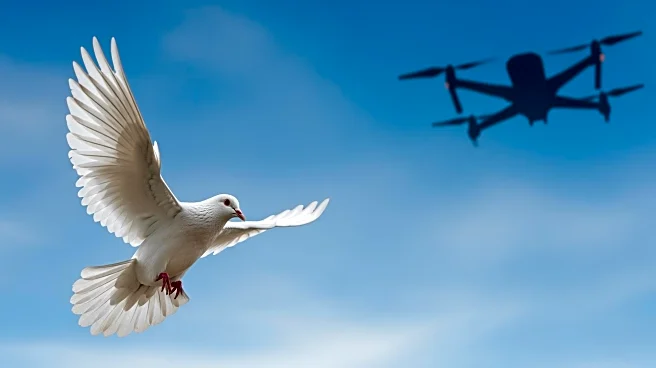What's Happening?
During a recent visit to Ukraine, actress Angelina Jolie experienced firsthand the constant threat posed by drones in the region. While visiting Mykolaiv and Kherson oblasts, Jolie had to pause her activities
as a drone flew overhead. She described the persistent drone presence as a 'constant, heavy presence' and noted the psychological toll it takes on local families who live under this threat daily. Jolie's visit, organized by the U.K.-based Legacy of War Foundation, aimed to bring attention to the plight of civilians in southern Ukraine, an area frequently targeted by Russian shelling. The actress highlighted the resilience of local humanitarian organizations and called on governments to protect civilians in conflict zones, including Ukraine, Sudan, Gaza, Yemen, and the Democratic Republic of Congo.
Why It's Important?
Jolie's visit underscores the ongoing humanitarian crisis in Ukraine, where civilians face daily threats from military actions. Her presence brings international attention to the region, potentially influencing global policy and humanitarian aid efforts. The situation in Ukraine is part of a broader pattern of conflict affecting civilians worldwide, and Jolie's advocacy may prompt increased international pressure on governments to address these issues. The involvement of high-profile figures like Jolie can amplify the voices of those affected and encourage global leaders to take action to protect vulnerable populations.
What's Next?
The international community may respond to Jolie's call for action by increasing diplomatic efforts to resolve the conflict in Ukraine and other regions she mentioned. Humanitarian organizations could see a boost in support and funding as awareness grows. Additionally, governments might face increased pressure to implement policies that protect civilians in conflict zones. Jolie's visit could also inspire other public figures to engage in similar advocacy efforts, further raising awareness and prompting action.
Beyond the Headlines
Jolie's visit highlights the ethical responsibility of global leaders to protect civilians in conflict zones. It raises questions about the effectiveness of current international policies and the role of humanitarian organizations in conflict resolution. The psychological impact on civilians living under constant threat is a critical issue that requires attention, as it affects not only immediate safety but also long-term mental health and community stability.









